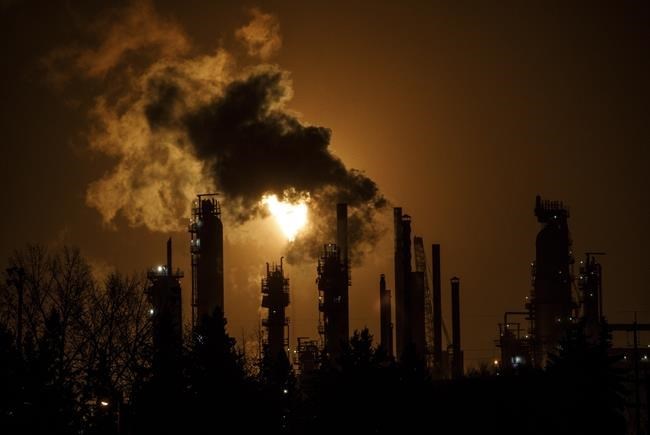TORONTO — Canada and other major fossil-fuel-producing countries are failing to meet targets to keep global warming in check, putting the world’s energy transition at risk, a newly released major international report warned Wednesday.
The 2023 Production Gap report says the countries are planning to produce 110 per cent more fossil fuels in 2030 than is consistent with keeping global warming to 1.5 C above pre-industrial levels, and 69 per cent more fossil fuels than what's in line with a target of 2 C.Â
"These plans throw the global energy transition into question. They throw humanity’s future into question. Governments must stop saying one thing and doing another, especially as it relates to the production and consumption of fossil fuels," Inger Andersen, executive director of the United Nations Environment Programme, wrote in a foreword to the report. Â
The report – co-produced by the United Nations Environment Programme, Winnipeg-based International Institute for Sustainable Development and several other leading climate groups – comes ahead of the COP28 climate conference later this month in Dubai, where leaders will discuss efforts to curb global emissions.Â
Of the 20 major fossil-fuel-producing countries profiled in the report, Canada’s planned increase to oil production for 2030, compared to 2021 levels, ranks behind only Brazil, the United States and Saudi Arabia, and just ahead of Russia and Kuwait. Norway and the U.K. were the only two countries projected to decrease both oil and gas production for 2030, according to the report.Â
"It shows a fundamental mismatch in the track that we are looking down for oil and gas production in this country versus where we would need to bend the curve to reach our climate targets," said Laura Cameron, a Winnipeg-based policy adviser with the International Institute for Sustainable Development, who contributed to the report.
By 2030, the United Nations estimates global emissions need to be cut by 43 per cent compared to 2019 levels to keep warming at 1.5 C and to get on a pathway to achieve net-zero emissions by 2050. And while the vast majority of the countries have pledged to hit the net-zero target, the report says none have committed to production cuts in line with a limit of 1.5 C.
The 2015 Paris Agreement sets out a global commitment to keep average temperature increase well below 2 C compared to pre-industrial times and aim for 1.5 C. Scientists have said crossing that 1.5 C threshold could unleash some of the most severe climate-change impacts, such as more frequent and severe heat waves.
The report comes on the heels of an audit released Tuesday by Canada's federal environment commissioner. That audit found Canada was well short of its emissions targets for 2030 and fewer than half of the policies outlined in the Emissions Reduction Plan had a timetable for implementation.Â
The Production Gap report and the commissioner's audit "really line up to show that we're not where we should be in terms of climate policies," said Cameron.Â
"We're at a crossroads," she said.Â
"The climate and economic rationale, are both pointing us in one direction towards reorienting our financial flows and policies towards low carbon economies. And, unfortunately, the government's plans for oil and gas production are pointing in another direction."
The international report released Wednesday does, however, highlight some encouraging signs.
It notes Canada is one of the countries that has taken steps to end international public financing for fossil-fuel projects. It also says Canada has joined three other countries – China, Germany and Indonesia – in starting to develop scenarios for domestic fossil fuel production consistent with national or global net-zero targets.
The report puts some cold water on carbon capture and storage technologies.
It says those technologies could play a role in helping reduce the emissions footprint of hard-to-transition sectors, but "they are not a free pass to continue with business as usual." Around 80 per cent of carbon capture pilot projects over the past 30 years have failed, the report said.Â
"Counting on these largely unproven and relatively costly technologies being rolled out at scale is thus a potentially risky and dangerous strategy," the report says.Â
The federal government rolled out a refundable tax credit for businesses investing in carbon capture and storage projects at an estimated cost of $2.6 billion over five years starting in 2022-2023, and $1.5 billion annually starting in 2026 until at least 2030. The Pathways Alliance, an industry group of Alberta oilsands companies, has been lobbying the federal government to support a massive carbon capture and storage network.
Given what the report calls the "risks and uncertainties of carbon capture," it says countries should aim for a near total phase-out of coal production by 2040 and a combined reduction in oil and gas production by three-quarters by 2050 from 2020 levels.Â
Many countries, the report says, are also promoting gas as a "bridge" or "transition" fuel, with no apparent plans to transition away from it.Â
"Gas could hinder or delay the transition to renewable energy systems by locking in fossil-fuel based systems and institutions," the report said.Â
This report by The Canadian Press was first published Nov. 8, 2023. Â
Jordan Omstead, The Canadian Press




